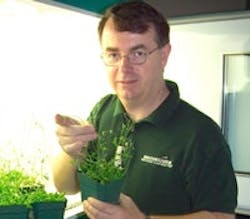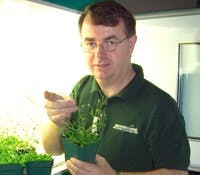Seeds May Grow As Feedstock Source
Many plants contain ω-7 fatty acids that could serve to make chemical feedstocks. However, the low levels of the fatty acids and those plants' growth characteristics preclude commercial production. Now, though, researchers at the U.S. Dept. of Energy's Brookhaven National Laboratory, Upton, N.Y., and Dow AgroSciences, Indianapolis, Ind., have metabolically engineered seeds whose oils contain the highest percentage of the fatty acids — more than 70% — thus enhancing the prospects of using seeds as a source of raw materials.
"Our new way of providing a feedstock sourced from fatty acids in plant seeds would be renewable and sustainable indefinitely," notes John Shanklin, a biochemist at Brookhaven who led the research. "…Our research shows that high levels of the appropriate feedstock can be made in plants."
"This proof-of-principle experiment is a successful demonstration of a general strategy for metabolically engineering the sustainable production of ω-7 fatty acids as an industrial feedstock source from plants," he adds.
The researchers now are performing further metabolic engineering to boost fatty acid levels even more. "We think 85% should be achievable," says Shanklin.
Their efforts focus on a common laboratory plant, Arabidopsis. Its growth and development reportedly were unaffected by the genetic modifications and accumulation of ω-7 fatty acids.
The seeds hold particular promise for plastic precursors. Ethenolytic metathesis of the ω-7 fatty acids produces 1-octene and 9-decenoate. The octene, now largely derived from ethylene, already is consumed at significant volumes to make linear low-density polyethylene, note the researchers.
Several academic and industrial research groups are working to improve metathesis catalysts, says Terrence Walsh, a research fellow at Dow AgroSciences.
"There are still significant technical hurdles to converting the potential feedstocks made in our proof-of-concept study into plastic precursors. This will require some significant technical breakthroughs over several years. One barrier is the development of an effective and cost-competitive catalytic process for converting plant-derived fatty-acid feedstocks into plastic precursors. Also, the genetic system for feedstock production that we demonstrated in a model plant will have to be transferred into an oilseed crop for large-scale production," Walsh explains.

